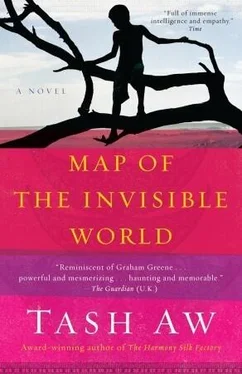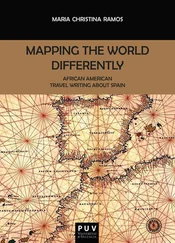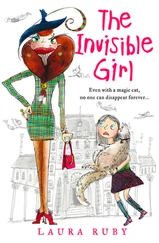Tash Aw - Map of the Invisible World
Здесь есть возможность читать онлайн «Tash Aw - Map of the Invisible World» — ознакомительный отрывок электронной книги совершенно бесплатно, а после прочтения отрывка купить полную версию. В некоторых случаях можно слушать аудио, скачать через торрент в формате fb2 и присутствует краткое содержание. Год выпуска: 2010, Издательство: Spiegel & Grau, Жанр: Современная проза, на английском языке. Описание произведения, (предисловие) а так же отзывы посетителей доступны на портале библиотеки ЛибКат.
- Название:Map of the Invisible World
- Автор:
- Издательство:Spiegel & Grau
- Жанр:
- Год:2010
- ISBN:нет данных
- Рейтинг книги:4 / 5. Голосов: 1
-
Избранное:Добавить в избранное
- Отзывы:
-
Ваша оценка:
- 80
- 1
- 2
- 3
- 4
- 5
Map of the Invisible World: краткое содержание, описание и аннотация
Предлагаем к чтению аннотацию, описание, краткое содержание или предисловие (зависит от того, что написал сам автор книги «Map of the Invisible World»). Если вы не нашли необходимую информацию о книге — напишите в комментариях, мы постараемся отыскать её.
comes an enthralling novel that evokes an exotic yet turbulent place and time—1960s Indonesia during President Sukarno’s drive to purge the country of its colonial past. A page-turning story,
follows the journeys of two brothers and an American woman who are indelibly marked by the past — and swept up in the tides of history.
Map of the Invisible World — читать онлайн ознакомительный отрывок
Ниже представлен текст книги, разбитый по страницам. Система сохранения места последней прочитанной страницы, позволяет с удобством читать онлайн бесплатно книгу «Map of the Invisible World», без необходимости каждый раз заново искать на чём Вы остановились. Поставьте закладку, и сможете в любой момент перейти на страницу, на которой закончили чтение.
Интервал:
Закладка:
“Of course these houses will not last very long,” Din shrugged, “but they can be quickly rebuilt. We are strong, practical people, remember,” he said.
They came upon a circle of men and women not much older than Adam; Din had explained that they were all students at UI. “This is the orphan I told you about,” Din announced casually to his friends, as if he had simply said “Sundanese” or “Torajan.” Adam felt angry with himself because he did not have the courage to explain and modify this description to a group of strangers (he did have a father, after all). But then again, maybe Karl was dead, and now he was an orphan twice over.
“Your orphan doesn’t look very happy,” one girl said. She was about Adam’s age, perhaps slightly older, and spoke in a voice similar to Din’s — steeped in a confidence that suggested formal education, with proper articulation tempered by a casual Jakarta accent. Their sharp, clever voices were a code, thought Adam, a method of conspiracy; he did not belong with these people. And yet this girl was not exactly like Din. She had a relaxed quality, a self-assuredness that ran deeper than mere education. It came from something else, something that Adam thought he could recognize: privilege, that sense of being special. He didn’t know if he could even call her a girl . She looked his age, but everything about her — her poise, her stylish hair (short and falling in soft curves on either side of her face, like a movie star’s, unlike the severe and functional hairdos of the other girls present), her easy vowels, the way she sat, legs crossed, one elbow propped on the table — made her seem like a mature woman.
“Orphans never are,” someone else added, and suddenly everyone was speaking.
“How can they be?”
“It’s impossible to find true happiness if you’re an orphan.”
“That’s not true. Orphans are the only ones who are free to find their own happiness; they don’t have their own history so they create it for themselves.”
“But, Z, that’s just an illusion. Their lives are determined for them by people who have no relation to them whatsoever — total strangers dictate their future. They have no attachment to anything, they stumble around in the dark until one day something happens to set them on a different, random path. I don’t call that freedom.”
“But that’s just what it’s like for all of us!”
There was laughter, either cold and scoffing or shrill and juvenile.
“We run a revolutionary magazine called- Z ,” said the girl with the stylish hair. Her name was Zubaidah, she explained, but she was known only as Zu, or even just Z. “I hate my full name. It’s too … pretty. When we started the magazine it needed a name, something that was not crass and obvious like the other dull, dogmatic pamphlets you see— Revolusi, Time for Change, The People’s Voice , and so on. It’s not easy to come up with a name for an underground literary newspaper, you know, so we just named it after me, just to give us something to get started.”
“But then I had a brainstorm,” a youth of perfect complexion said. He had long hair that hung in fine strands almost to his shoulders; he was trying to grow a beard, but he’d managed only a meager mustache and a straggly goatee. “‘Z!’ I said — the last letter of the alphabet, ignored, mysterious, underutilized. Perfect!”
“Awie is the poet among us, you see,” said Z.
“In fact, Z stands alone at the end of the alphabet, lonely, without any prospects in life, abandoned by all the others. It is the orphan of the alphabet — it should appeal to you.”
He slid a flimsy, shoddily bound magazine across the table toward Adam. “Our latest issue.”
Adam flicked through it, pausing occasionally, pretending to read; he nodded, feigning comprehension and appreciation. The dense text was punctuated by several cartoon drawings. There was one of the president in bed with a busty European woman, their huge feet protruding from the tangle of sheets, toothy grins etched across their faces. It was set next to another drawing of the president gnawing on a gargantuan chicken drumstick in a field of wilting rice; in the background a farmer surveyed the cracked mud, his shoulders hunched. The caption under both drawings read: OUR HERO.
“Shh, quiet — the speech is about to start,” said Din. He had not lost his frown, which seemed, if anything, to have deepened, creating little crevasses across his forehead. He glared at Adam and jabbed his index finger in the direction of the radio that sat on a chair, all on its own in the middle of the group. They all shuffled their chairs toward it, leaning forward, elbows resting on knees, chins cradled in palms, ready to fall deep into concentration. Adam copied their movements. He remembered the tales of ancient philosophers that Karl had told him about and felt as if he were a pupil or scribe at the feet of some electronic preacher. There was a moment of near-complete silence; they could not hear even the faintest crackle of static from the radio. In the distance there was a baby’s cry, a thin wail that started and then stopped; there was no other noise from the slums around them. Adam wondered if the radio had failed at the crucial moment. He held his breath, listening. No one moved. And then the voice began speaking in a tone at once urgent and measured. He had never heard a voice like this before: rich with calm strength and intonations that seemed both foreign and familiar. He felt a hot surge running through his body, filling his head with a sudden, giddy excitement he could not explain. He remembered wading into the sea for the first time, into the warm gentle surf, with Karl standing in the shallows; he remembered the brilliant reflection of the sun on the water, the wild feeling of danger when he uncurled his toes and surrendered his body to the waves, his arms and legs moving with a freedom he had never known, as if he had only just discovered his body; he remembered too dipping his head under water and finding an entire watery world whose depth and enormity he had never discerned from land, a place in which he was powerless and small. He was gasping when he resurfaced, afraid of being dragged away; but part of him had wished, secretly, to be taken by the sea. “…fellow countrymen and revolutionaries, the twentieth century has been a time of terrific dynamism, but also of great fear. Yes, we are living in a world of fear. The life of man is corroded and made bitter by fear — fear of the future, of the hydrogen bomb, of ideologies, of everything, but especially of the loss of man’s safety and morality. Perhaps this fear is a greater danger than the danger itself, because it is fear that drives men to act foolishly, to act thoughtlessly….”
“Just get to the point,” Din muttered. A sharp chorus of shushing started and died down with equal swiftness, and once again the voice on the radio was the only sound to be heard.
“… nowadays to hear people say, ‘Colonialism is dead.’ Let us not be soothed or deceived by this. I say to you, friends and fellow revolutionaries, that colonialism is NOT dead. How can it be, so long as vast areas of Asia and Africa are not yet free? I beg of you not to think of colonialism only in the classic form we in Indonesia have known — it is a skillful and determined enemy that warps, viruslike, into its modern form of economic and intellectual control….”
Din sighed; it seemed very loud in the unnatural silence around them. “How many times have we heard this before?” he whispered in Adam’s ear. Instinctively, Adam moved away from his hot, sour breath. In those few seconds he had missed what the voice had said, and he too began to wish that Din would keep quiet.
Читать дальшеИнтервал:
Закладка:
Похожие книги на «Map of the Invisible World»
Представляем Вашему вниманию похожие книги на «Map of the Invisible World» списком для выбора. Мы отобрали схожую по названию и смыслу литературу в надежде предоставить читателям больше вариантов отыскать новые, интересные, ещё непрочитанные произведения.
Обсуждение, отзывы о книге «Map of the Invisible World» и просто собственные мнения читателей. Оставьте ваши комментарии, напишите, что Вы думаете о произведении, его смысле или главных героях. Укажите что конкретно понравилось, а что нет, и почему Вы так считаете.












